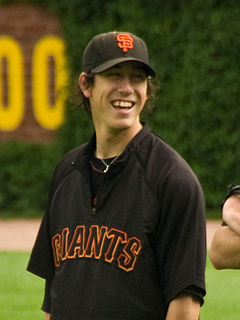A Quote by John Buffalo Mailer
My father probably taught me everything I know, aside from dialogue, which I think I get from my mom a lot more. He certainly didn't teach me everything he knew, but you know he has got this book out called "The Spooky Art," which is essentially an advanced book on writing and it's not... You know it's not ABC, but it's for people who feel that bug and know that they're writers and are willing to put in that time alone. Pretty much the vast majority of what he taught me you can find in that book.
Related Quotes
I think I sent one [book] to Brian Eno. I don't know how I got to know his address, but I sent one to him. He called me up and he said, "I really like the book, and I'm starting a new label, would you liked to do something?" It was a tricky situation for me, because I've always had this thing in my life of a tension between collaboration, which was extremely important to me, and then being alone. Make of that what you will!
If I'm writing a story and you're reading it, or vice versa, you took time out of your day to pick up my book. I think the one thing that will kill that relationship is if you feel me condescending to you in the process. And how does that happen? Well, it happens when I know more than you do, and when I know that I know more than you do, and I'm holding it back from you. So that I can then manipulate you at the end. You know, you think about like in a dating situation how terrible that would be, it's the same thing with a book.
Now, almost twenty years since my last job in book publishing, I know that there are far more socially inept people in book than in magazine publishing. At the time, however, I just didn't feel I was enough: smart enough, savvy enough, well read enough, educated enough, charming enough. Much of this was probably because I was very naive, and didn't really know how to behave in an office. This made me a terrible assistant, which in turn made me a terrible junior book editor.
Writing a book about [Buckminster Fuller] in the sense of deciding how much to - how much biographically to gloss over and how much I can leave out is relatively easy as it is because the true believers already know everything. They know a lot of things that are not true and they know a lot of things that I thought were (and seems there's very good evidence not to believe) and therefore, my starting point was I think to tell his myth because that's what grabbed me.
If you can find two poems in a book, it could be a pretty good book for you. You know, two poems you really like. There are some poets who are fairly big names in contemporary poetry and who write a book and I might like three or four poems in the book, but the rest of them don't appeal to me personally; but I think that's the way it really ought to be. I think it's really a rare thing to like everything that somebody has written.
Tegus, I'm leaving this book behind for you, so you will know the why of it all, and maybe you'll forgive me, or maybe you'll think me false and reprehensible. You'd be justified. I couldn't stand the thought of your reading all my words unless I knew for certain that I'd never have to face you again, so please don't look for me. If you read the book in its entirety, you'll know for truth who is Lady Saren. And I guess you'll also know that I'm a silly girl who writes down every word you said to me.
"The Diagnosis" is by far my most ambitious book. I such great hopes for it... there was so much I wanted to do with the book. I was extremely insecure about it for several years. Just didn't know whether I would finish the book much less for it to come close to what I intended. I think that for any novel you never know exactly how the book is going to turn out...
I think I write or publish as much as I do because I can bear being without a book to work on. But routinely when I finish a book, I think, "What will I do? Where will I get an idea?" And a kind of low-level panic sets in. And then eventually something happens. I don't know. If I knew how it happened I would repeat the process, but I don't know - something just occurs to me.
I know it's late, but could you find a book for me? It's called The Slavs: Study of Pagan Tradition by Osvintsev." Barabas sighed dramatically. "Kate, you make me despair. Let's try that again from the top, except this time pretend you are an alpha." "I don't need a lecture. I just need the book." "Much better. Little more growl in the voice?" "Barabas!" "And we're there. Congratulations!



































